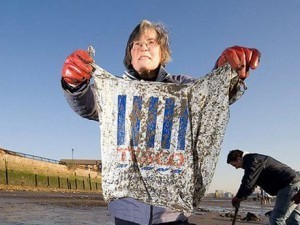Three passages leaped out at me from this recent article published in the UK’s Guardian newspaper.
1. Save the Humans
Only £5.7m or 0.6% of the total spend by the groups went towards air, noise and water pollution, even though the evidence suggests this is costing Britain more than £10bn a year in healthcare costs, and together receive more complaints than anything else.
Most of the rest of the money went on traditional conservation of plants and animals. This suggests that environmentalism is still generally associated with saving the planet’s flora and fauna, rather than its human inhabitants. This reflects – or perpetuates – the myth that environmentalism is an altruistic endeavour, a luxury.
We need to get the message across that it is not the planet that needs saving, it is the humans.
2. Tackle Root Causes, Not Symptoms
Only 1.2% of their income is spent on
activism
towards government or corporations, and less than 3% of their income went on trying to get people to behave differently.
While this pattern persists, we are at best slapping a band aid on our problems. Unless governments, corporations and individuals ALL change their behaviour, the impact of most charitable giving to environmental causes is going to be trivial and short-lived.
I’d like to call on donors to environmental charities (you wonderful people!) to ask your chosen causes to divert more of their funds to significant and long-lasting policy change.
3. Combine and Conquer

Breaking the Bag Habit
“[There is] a need for a very heavily populated and fragile sector to consolidate, merge and achieve the scale necessary to drive public opinion and force change when working with large business interests and increasingly international institutions,” said one chief executive, who is not named.
Another said: “The sector is overcrowded with many NGOs driven by funding/funders’ agendas or relatively specialist (insignificant?) issues. As a sector we lack any real strategy, nor have we considered building partnership models that could achieve real gains for the environment.”
Amen! It almost makes me want to cry, to see so much money, time, effort, passion and energy expended to so little effect. I am encouraged to see more coalitions emerging, such as the Break the Bag Habit coalition, made up of Keep Britain Tidy, Surfers Against Sewage, the Marine Conservation Society and Campaign for the Protection of Rural England, along with Thames 21 and Greener Upon Thames, which has long been urging the government to follow the example of Wales, Scotland and Northern Ireland and introduce a charge on all single-use carrier bags.
At last they succeeded, and the 5p bag charge will be implemented in 2015, after the election. These organisations may have differences of size, budget, contribution and philosophy, but by putting their differences aside and combining efforts they prevailed.
We all have to live on this Earth. It’s not about what country we come from, or what organisation we belong to – if we all pull together, we CAN make a world of difference!
 newest »
newest »
 newest »
newest »
 Another idea: Work to change your town, county or other local region in some significant way. Coalitions can be very effective on this scale as well. And, be sure that you exemplify the change you seek. Continuing to use single-ue carrier bags because they are convenient, while you seek to see them phased out is not going to help the cause.
Another idea: Work to change your town, county or other local region in some significant way. Coalitions can be very effective on this scale as well. And, be sure that you exemplify the change you seek. Continuing to use single-ue carrier bags because they are convenient, while you seek to see them phased out is not going to help the cause.
 Hi Stan - I can't think of any of my colleagues at Greener Upon Thames, or in fact any of the other Break the Bag Habit organisations, who would still use a single-use plastic bag. I'm not saying this is universal, but generally once someone is made aware of the problems of plastic, they seek to reduce their usage as much as possible. Awareness really is such an important first step.
Hi Stan - I can't think of any of my colleagues at Greener Upon Thames, or in fact any of the other Break the Bag Habit organisations, who would still use a single-use plastic bag. I'm not saying this is universal, but generally once someone is made aware of the problems of plastic, they seek to reduce their usage as much as possible. Awareness really is such an important first step.
 Roz wrote: "Hi Stan - I can't think of any of my colleagues at Greener Upon Thames, or in fact any of the other Break the Bag Habit organisations, who would still use a single-use plastic bag. I'm not saying t..."
Roz wrote: "Hi Stan - I can't think of any of my colleagues at Greener Upon Thames, or in fact any of the other Break the Bag Habit organisations, who would still use a single-use plastic bag. I'm not saying t..."



